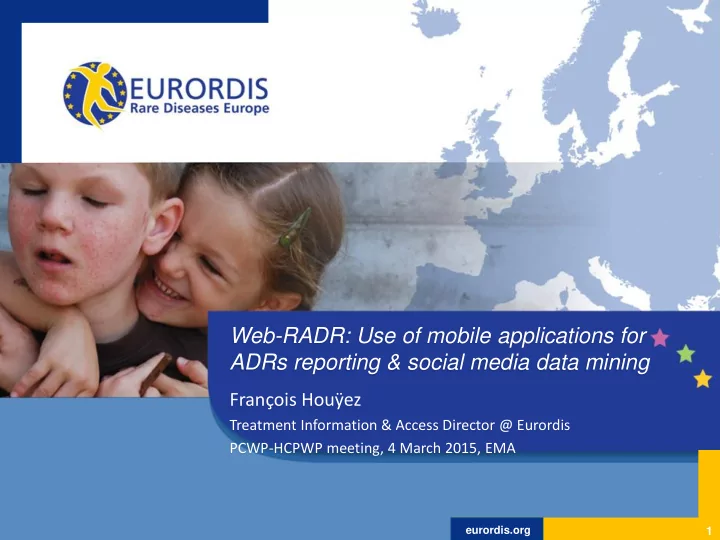

Web-RADR: Use of mobile applications for ADRs reporting & social media data mining François Houÿez Treatment Information & Access Director @ Eurordis PCWP-HCPWP meeting, 4 March 2015, EMA eurordis.org eurordis.org 1
Opportunities 08 August 2014 • Apps for healthcare professionals 97,000 health apps in • Apps for patients/consumers app stores To distinguish between FDA regulates medical apps that • Health & fitness apps correspond to a medical device • Medical apps 100 med apps regulated as of 08/2014 A medical app that monitor user’s own A medical app that medical/health data is a medical device provides information is (e.g. electrocardiogram sensor to smartphone not a medical device equivalent to 24h ECG Holter monitor) eurordis.org 2
Most of the time: data sent to a HCP Limits Are HCPs ready to receive millions of data with real-time action? Can healthcare apps be trusted? Actual use of these med In other words, are they regulated? Or are apps by patients is low regulators involved in their design, use? Many app developers have little or no formal medical training and do not involve clinicians in the development process Lewis TL, Wyatt JC. mHealth and Mobile Medical Apps: A Framework to Assess Risk and Promote Safer Use J Med Internet Res 2014;16(9):e210. URL: http://www.jmir.org/2014/9/e210 FDA regulation Potential to do harm Mobile Medical Applications Diagnostic Inaccuracy of Smartphone Applications for Melanoma Detection Here Even the most accurate of the apps that used algorithms missed 18/60 lesions diagnosed as melanoma and deemed them low-risk for cancer Joel A. Wolf et al, University of Pittsburgh Medical Center, See Mike Brown JAMA Dermatol. 2013;149(4):422-426. doi:10.1001/jamadermatol.2013.2382 Mobile App Testing Blog www.mobileapptesting.com eurordis.org 3
Possible features of an app to report ADRs Need for a guide to choose MedDRA preferred term Environmental factors (Pharmaco-eco-epidemiology) “My belly is slightly enlarged…” Drug ineffective (counterfeit), shortage… Questions 1 week after report: improved? worsened? eurordis.org 4
Issues (1) • A medical app to report suspected ADRs – In a patient’s life, how many times do we report ADRs? – Do we need a specific app, or a reporting system embedded in other med app we may use? • Elderly and med apps/smartphones • Who’s receiving the report? – Health authorities? Industry as well? – Response: pharmacovigilance experts, national authorities • Patient ID or not? – Do we want to be called/emailed/texted back? eurordis.org 5
Issues (2) • Which immediate feedback? www.adrreports.eu – Other similar reports, same product, same type of reaction • Geolocation: opportunity or intrusion? – To detect counterfeit medicines – To report shortages – To report other environmental data • In Web-RADR: EU funding only for UK and Croatia – What about adaptation for other MS? – Their own resources? • If app developer acquired by third party, what about governance, guidelines, rules of use? eurordis.org 6
Issues (3) on the data mining tools • Which social media? – Principle: only exchanges which are publicly accessible will be monitored (to the exclusion of private messages 1-to-1) • Monitoring? Surveillance? Big Brother? – Do we feel comfortable our posts are scrutinised and automatically analysed? – Health authorities are interested by what we say, excellent! It’s only normal • Will social media access the results? – During the research phase of Web-RADR? – As usual practice afterwards? • An opportunity for two-way communication: DTCI- like risk? eurordis.org 7
YOUR VIEWS? QUESTIONS? eurordis.org 8
Recommend
More recommend